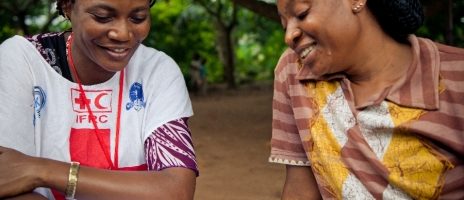The regional perspective
IFRC works with partners to develop an innovative approach to designing surveys and improving the timeliness and accuracy of data collection.
The rapid spread and use of mobile technology throughout the world offers program managers and researchers new and exciting means of data collection. The time and monetary costs of data collection can be substantially reduced if mobile phone-based questionnaires are used in place of the traditional paper and pencil method that has been the best practice in surveys for decades.
Over the past few years, the International Federation of Red Cross and Red Crescent Societies (IFRC) has worked with partners to develop an innovative approach to designing surveys and improving the timeliness and accuracy of data collection. This approach is called the Rapid Mobile Phone-based (RAMP) survey. The RAMP toolkit is available to download from our site in English and French.
RAMP provides a survey methodology and operations protocol that will enable national Red Cross Red Crescent societies, governments and other partners to conduct surveys rapidly, at reduced costs, with limited or no external assistance.
In 2011 and early 2012, RAMP was piloted by Red Cross societies, the IFRC and partners in Kenya, Namibia and Nigeria. In these countries malaria is a major public health problem. Programme managers were interested in finding out the extent to which malaria programme objectives were being reached. The surveys provided statistically significant data in a number of areas including: ownership and use of long-lasting insecticide-treated nets (LLINs), and the percentage of children under five years old that were accessing health services within 24 hours of the onset of fever. A RAMP survey bulletin was available within 12 hours of completion of the final survey questionnaire with a full draft survey report available within 72 hours.
Coming soon!
E-mail: Mr. Pornsak Khortwong (PK), at pornsak.khortwong@ifrc.org
Guiding Documents
- Volume 1. Designing a RAMP Survey: Technical Considerations, November 2012 (RAMP Toolkit 1)
- Volume 2. Implementing a RAMP Survey: Practical Field Guide, Focusing on LLIN Post-Campaign Survey, November 2012 (RAMP Toolkit 2)
- Volume 3. Training a RAMP Survey Team: Guide for Trainers, Focusing on a LLIN Post-Campaign Survey, November 2012 (RAMP Toolkit 3)
![]()


